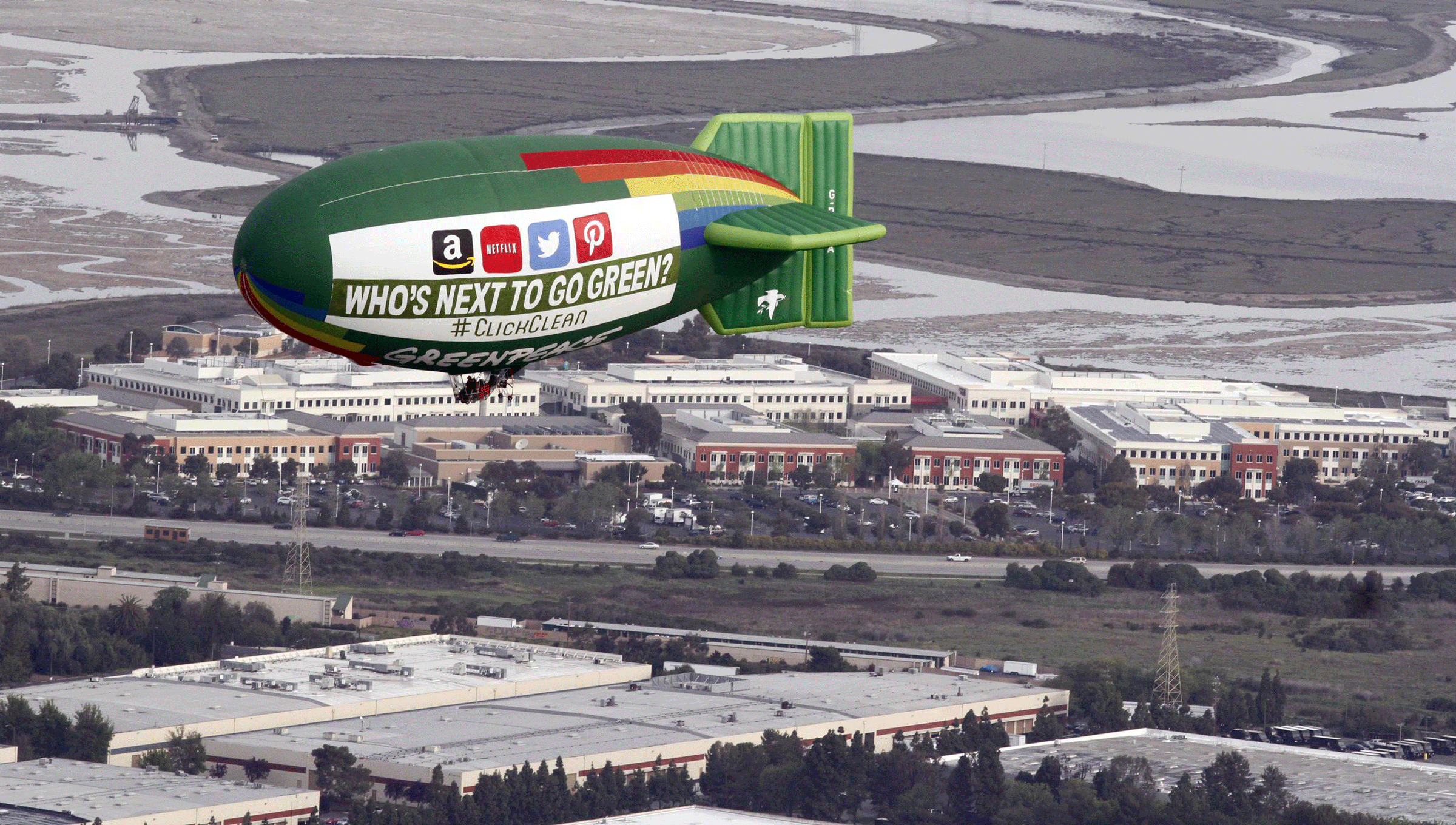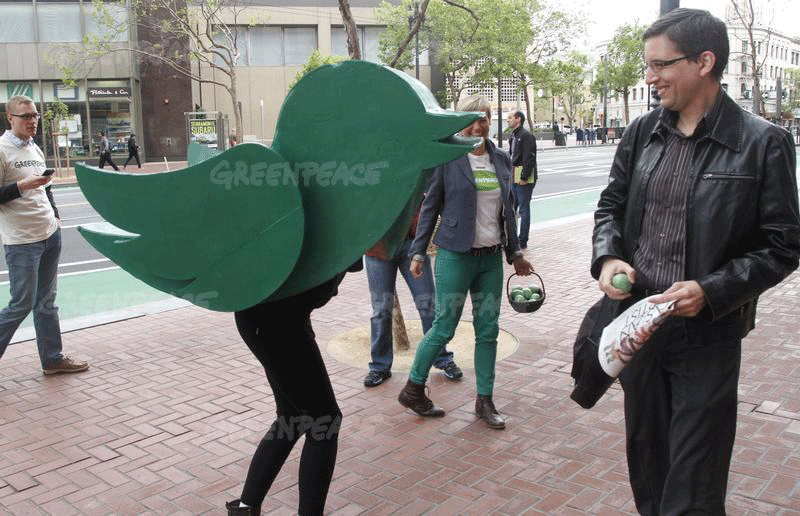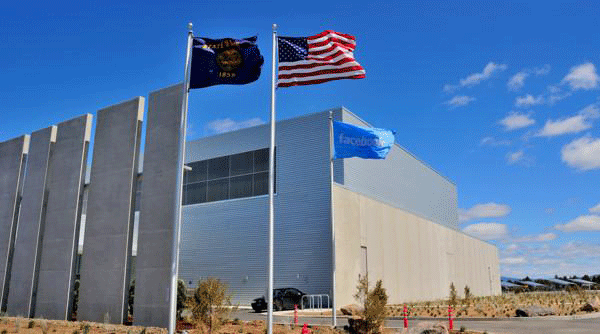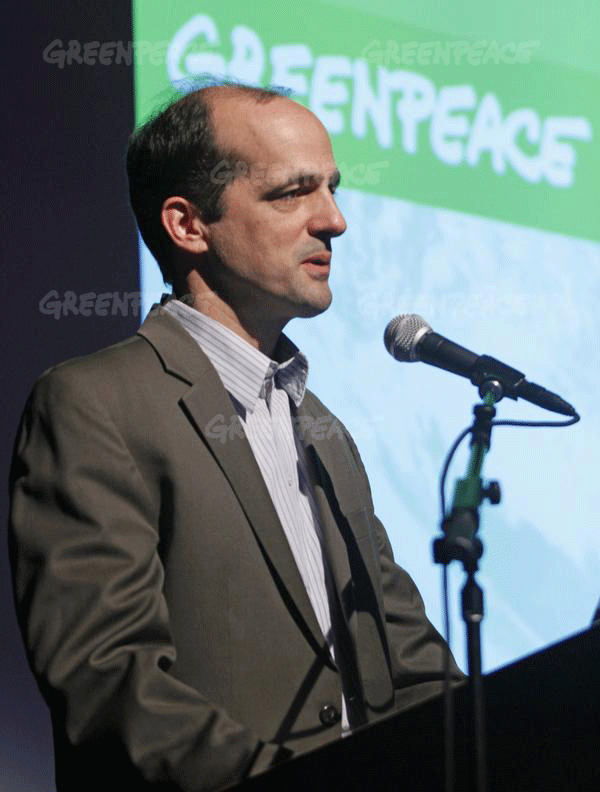Greening the Web
Air Date: Week of April 11, 2014

The Greenpeace Airship A.E. Bates flies over Facebook headquarters with a banners reading "Building a Greener Internet" and "Who's The Next To Go Green?" Apple, Facebook and Google have committed to powering their data centers with renewable energy, and Greenpeace is challenging other tech companies (Amazon, Twitter, Netflix and Pinterest) to join them. (photo: George Nikitin, Greenpeace)
If the internet were a country, it would be the sixth largest consumer of electricity in the world. Greenpeace analyst Gary Cook has written a new report detailing which tech companies are using renewable energy to power their servers. He tells host Steve Curwood who’s helping to green the web.
Transcript
CURWOOD: It's Living on Earth, I'm Steve Curwood. We've made it a custom during April - Earth Month - to update some of our past stories, and today we have a mostly good news story to report. Two years ago we spoke with Gary Cook of Greenpeace about its campaign to persuade major Internet companies to use renewable sources of electricity. Greenpeace calculates that the IT industry is the sixth largest consumer of electricity worldwide and its greenhouse gas emissions are roughly equivalent to those of the airline industry. Well, now Greenpeace reports some companies have made amazing progress in this arena, though there are some laggards. Gary Cook joins me now to discuss the new report. Welcome back to Living on Earth, Gary.
COOK: Thanks very much, Steve. Good to be here.
CURWOOD: So back in 2012, you criticized Apple for using carbon-intensive energy from coal plants to power its servers. Let’s listen.
COOK: Apple is one of the most innovative and popular companies in the world. They challenged us all to ‘think different’ in the past, and what Apple really needs to do is accept that challenge with regards to its energy use for its cloud. So what they really need to be doing is demanding better from Duke energy, who has a number of coal plants very close by that use mountain top removal coal from Appalachia, and they’re a big customer. They have the ability to demand better, that Duke think different, and provide them clean energy.

A Greenpeace activist in a green Twitter costume outside Twitter headquarters. (photo: George Nikitin, Greenpeace)
CURWOOD: Well, Gary Cook. It’s been two years. How’s Apple doing now?
COOK: Apple has been thinking different fortunately for us all. Just after we spoke, they even made a commitment to be 100 percent renewably powered, and as the end of last year, they even made that goal. So, it’s been quite a big shift.
CURWOOD: 100 renewable energy. How’s that possible?
COOK: It requires some effort. Apple has done a lot in North Carolina where they have their largest data center in terms of deploying two different solar farms and an onsite fuel cell that’s powered with biogas energy, so it’s all renewable. They have several other data centers which, depending on the location - in Oregon they’re using wind, in Nevada they’re using solar again.
So they’ve actually shown a commitment from the top, been very aggressive, probably the most aggressive of any of the brands to make sure as they grow, they’re using clean energy.
CURWOOD: Biogas. Where are they getting that from?'

Facebook’s data center in Prineville, Oregon (photo: Intel Free Press, Creative Commons 2.0)
COOK: Currently, they’re getting that from landfill and some other renewable sources. The landfill is methane capture in the southeast, and they’re having that piped to where their data center is in North Carolina.
CURWOOD: What other companies are doing what you see is a good job when it comes to powering the internet?
COOK: Well, fortunately, it’s not just Apple. We’ve seen Facebook and Google, they’ve been very aggressive as well. Facebook is a great example of a transition we’ve seen in the last two years, where two, three years ago they were growing quickly, building locations that were mostly coming from coal power, but their data center, they just announced over a year ago in Iowa, is now going to be 100 percent renewable, and as a result of their investment there, has gotten the utility to spend over $2 billion on a new wind farm investment, and it’s resulted in the largest order of wind turbines in history. So it shows when companies hear from their customers, get motivated and have real commitment, they can make a big difference about where their energy comes from.
CURWOOD: Wow. So Facebook, the company is actually driving a change at the utility level, you’re saying?
COOK: Exactly. Our online world, it uses a lot of electricity. If it was a country, it would rank up there in the top six in electricity consumption. But if we grow it in the right ways, with the right power, it has the potential to help us make that transition to renewables. And we’ve seen a few of the companies like RackSpace and SalesForce and Box also make big commitments to renewable energy, and they’re starting to shift what powers the grid.
CURWOOD: So what technology, what internet related companies aren’t doing such a good job in your latest survey?
COOK: The most prominent would probably be Amazon.
CURWOOD: From your perspective, how bad is Amazon? How much climate-destroying power are they using, do you think?
COOK: It’s difficult to tell, to be honest, because Amazon is, unfortunately, very much reluctant to reveal any information on where they get their energy from, or how large they are. A lot of other online properties use their data centers. Netflix is one of them. They use them instead of building their own.

Greenpeace International Senior IT Policy Analyst Gary Cook speaks at a forum on the sustainability of the IT sector at the Exploratorium. (photo: George Nikitin, Greenpeace)
We’ve done our own assessment and put that out there. Because they’re such big customers, if they were committed to renewable energy in the same way that some of these other big companies are, they could really start to shift the needle on where the grid gets its energy. And honestly, the longer they wait, the more they risk in terms of their brand and their market share because I think some of their competitors are leading the way in renewables, and the longer they wait, the longer they’ll have to catch up.
CURWOOD: Where’s Microsoft in all this?
COOK: Microsoft has been one that has unfortunately been lagging behind. They have made a commitment to be carbon neutral, but up until recently at least, they had been mainly doing that through buying carbon offsets and paying for renewable energy credits. However, just as a few months ago, they made their first long-term contract for wind energy in Texas to power their data center in San Antonio. So that’s a great sign, we hope to see more from them in the months to come.
CURWOOD: How big of a deal is this Gary? How much does powering the internet contribute to climate change?
COOK: Others have estimated it’s roughly on par with airline travel in terms of the greenhouse gas emissions, and it’s growing very quickly. Right now, at its best estimates, we have between two-and-a-half to three billion people who are currently online, and expect that to double by the end of the decade. So more and more people are going to be relying on this technology, and that’ probably a good thing in many ways. But if we do it with the same old energy sources we had before, it would actually take us in the other direction. And we see companies who say, “We can do better than that. We don’t have to take just whatever’s off the rack. We can demand better,” and use their buying power in ways that makes their energy green and makes the grid green for all of us.
CURWOOD: Gary Cook is a Senior Policy Analyst for Greenpeace. Thanks for joining us again.
COOK: Thanks so much, Steve.
Links
Living on Earth wants to hear from you!
Living on Earth
62 Calef Highway, Suite 212
Lee, NH 03861
Telephone: 617-287-4121
E-mail: comments@loe.org
Newsletter [Click here]
Donate to Living on Earth!
Living on Earth is an independent media program and relies entirely on contributions from listeners and institutions supporting public service. Please donate now to preserve an independent environmental voice.
NewsletterLiving on Earth offers a weekly delivery of the show's rundown to your mailbox. Sign up for our newsletter today!
 Sailors For The Sea: Be the change you want to sea.
Sailors For The Sea: Be the change you want to sea.
 The Grantham Foundation for the Protection of the Environment: Committed to protecting and improving the health of the global environment.
The Grantham Foundation for the Protection of the Environment: Committed to protecting and improving the health of the global environment.
 Contribute to Living on Earth and receive, as our gift to you, an archival print of one of Mark Seth Lender's extraordinary wildlife photographs. Follow the link to see Mark's current collection of photographs.
Contribute to Living on Earth and receive, as our gift to you, an archival print of one of Mark Seth Lender's extraordinary wildlife photographs. Follow the link to see Mark's current collection of photographs.
 Buy a signed copy of Mark Seth Lender's book Smeagull the Seagull & support Living on Earth
Buy a signed copy of Mark Seth Lender's book Smeagull the Seagull & support Living on Earth

